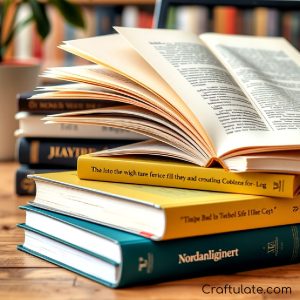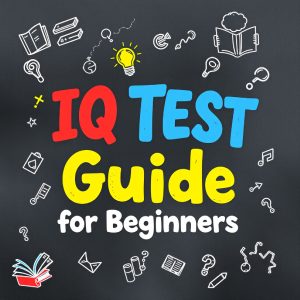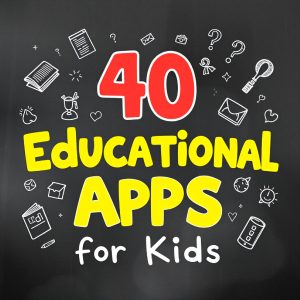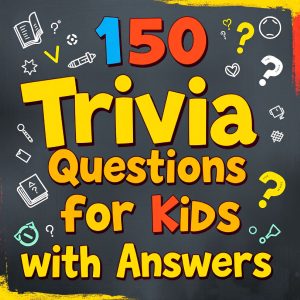This article is packed with a wide variety of riddles for adults with answers, designed to challenge your brain and keep you entertained for hours. We’ve included riddles that are easy to solve, some that require a bit of math, others that will make you laugh, and a few that are truly hard.
Riddles are a great way to have fun and exercise your mind. They can be enjoyed alone or with friends and family. In social settings, riddles can break the ice, spark conversation, and even lead to friendly competition.
The riddles for adults are listed below, with their answers hidden. Try to solve them on your own, and then click to reveal the answer. Have fun!
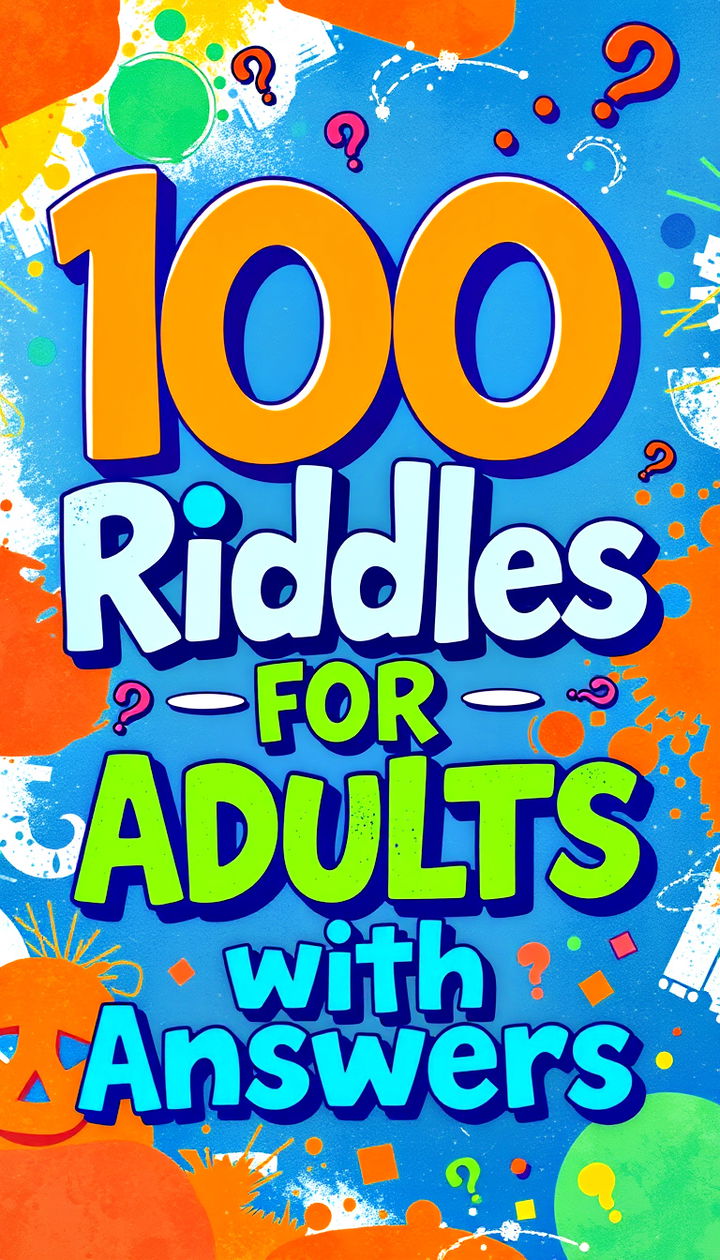
Easy Riddles
Easy riddles are typically straightforward and rely on common sense or basic knowledge. They’re a great way to get started and build confidence in your riddle-solving abilities.
1. I have cities, but no houses; forests, but no trees; and water, but no fish. What am I?
Answer: A map.
Explanation: Maps represent geographical features but don’t contain the actual physical elements.
2. What has an eye but cannot see?
Answer: A needle
Explanation: A needle has a hole at one end called the “eye” where the thread is inserted, but it cannot see.
3. What has to be broken before you can use it?
Answer: An egg
Explanation: You need to crack the shell of an egg before you can use its contents.
4. I am always coming, but never arrive. What am I?
Answer: Tomorrow
Explanation: Tomorrow is always a day away; it never actually arrives in the present.
5. What has a neck without a head, a body without legs?
Answer: A bottle
Explanation: Bottles have a narrow neck and a wider body, resembling a torso, but they lack a head and legs.
6. What gets wetter and wetter the more it dries?
Answer: A towel
Explanation: A towel absorbs water, making it wetter as it dries other things.
7. What has no voice but can still tell you many things?
Answer: A book
Explanation: Books contain written words that convey information and stories, even though they don’t have a literal voice.
8. What question can you never answer yes to?
Answer: Are you asleep yet?
Explanation: If you’re asleep, you can’t answer. If you can answer, you’re not asleep.
9. What is full of holes but still holds water?
Answer: A sponge
Explanation: Sponges have a porous structure that allows them to absorb and hold water despite having many holes.
10. I have keys, but no locks. I have space, but no rooms. You can enter, but you can’t leave. What am I?
Answer: A keyboard
Explanation: Keyboards have keys you press, but no physical locks. They have space between keys, but no enclosed rooms. You can type on a keyboard (enter), but you can’t physically exit it.
Math Riddles
Math riddles combine logic and numerical skills to create puzzles that challenge your problem-solving abilities. They often require careful calculation or clever thinking to arrive at the solution.
11. What number is the same upside down and backward?
Answer: 6
Explanation: The number 6, when flipped vertically or horizontally, remains the same.
12. If two’s company, and three’s a crowd, what are four and five?
Answer: Nine
Explanation: This is a simple addition riddle, 4 + 5 = 9
13. A farmer has 17 sheep, and all but 9 die. How many sheep are left?
Answer: 9
Explanation: The wording is tricky. “All but 9 die” means 9 sheep survive.
14. What 3 positive numbers give the same result when multiplied and added together?
Answer: 1, 2, and 3
Explanation: 1 + 2 + 3 = 6 and 1 x 2 x 3 = 6
15. If there are 12 fish and half of them drown, how many are left?
Answer: 12
Explanation: Fish don’t drown!
16. I am an odd number. Take away a letter and I become even. What number am I?
Answer: Seven
Explanation: Removing the “s” from “seven” leaves “even.”
17. What number do you get when you multiply all of the numbers on a telephone’s number pad?
Answer: Zero
Explanation: The number pad includes zero, and any number multiplied by zero equals zero.
18. If you’re 8 feet away from a door and with each move you advance half the distance to the door. How many moves will it take to reach the door?
Answer: You will never reach the door.
Explanation: This is a variation of Zeno’s Paradox. You will keep halving the distance, getting closer and closer, but never actually reaching zero distance.
19. If a train leaves New York at 3 PM and travels at 100 mph, and another train leaves California at 5 PM and travels at 120 mph, where will they meet?
Answer: Somewhere in between New York and California.
Explanation: This riddle requires more information, such as the distance between the cities and the direction each train is traveling, to determine the exact meeting point.
20. A man is twice as old as his son. In 20 years, the man will be 1.5 times as old as his son. How old are they now?
Answer: The man is 40, and his son is 20.
Explanation: Let the son’s current age be ‘x.’ The man’s current age is ‘2x.’ In 20 years, the son will be x + 20, and the man will be 2x + 20. At that time, the man will be 1.5 times as old as his son: 2x + 20 = 1.5(x + 20). Solving for x, we get x = 20 (son’s age), and 2x = 40 (man’s age).
Funny Riddles
Funny riddles add a touch of humor to the puzzle-solving experience. They often rely on puns, wordplay, or unexpected twists to create a playful and entertaining challenge.
21. What has an ear but can’t hear?
Answer: A cornfield.
Note: This riddle plays on the double meaning of “ear” – the body part and the part of a corn stalk.
22. What has a bottom at the top?
Answer: Your legs.
Note: This riddle uses a playful perspective shift to create a silly image.
23. What has 13 hearts, but no other organs?
Answer: A deck of cards.
Note: This riddle plays on the double meaning of “hearts” – the organ and the suit in a deck of cards.
24. What can you catch, but not throw?
Answer: A cold.
Note: This riddle plays on the figurative and literal meanings of “catch.”
25. What kind of tree can you carry in your hand?
Answer: A palm.
Note: This riddle uses a pun on the word “palm” – the tree and the part of your hand.
26. What has no legs, but can travel the world?
Answer: A stamp.
Note: This riddle highlights the contrast between the inanimate object (stamp) and its ability to travel on letters and packages.
27. What has a neck without a head, and wears a cap?
Answer: A bottle.
Note: This riddle combines the physical attributes of a bottle with the image of a cap to create a humorous image.
28. What has to be broken before you can eat it?
Answer: A nut.
Note: This riddle plays on the double meaning of “broken” – physically cracked and solved (like a code).
29. I’m tall when I’m young, and I’m short when I’m old. What am I?
Answer: A candle.
Note: This riddle describes the changing height of a candle as it burns down.
30. What is always hungry but never eats?
Answer: Fire.
Note: This riddle personifies fire, attributing the characteristic of hunger to its constant consumption of fuel.
Logical Riddles
Logical riddles test your deductive reasoning and problem-solving skills. They often present a scenario or a set of clues, and you must use logic to piece together the solution.
31. A man is looking at a photograph of someone. His friend asks who it is. The man replies, “Brothers and sisters, I have none. But that man’s father is my father’s son.” Who was in the photograph?
Answer: His son.
Explanation: The man’s father’s son is himself. Since he has no siblings, the photo must be of his son.
32. What is greater than God, more evil than the devil, the poor have it, the rich need it, and if you eat it, you’ll die?
Answer: Nothing.
Explanation: This riddle plays on the extreme nature of the descriptions. Nothing is greater than God, nothing is more evil than the devil, the poor have nothing, the rich need nothing, and if you eat nothing, you’ll die.
33. I am taken from a mine, and shut up in a wooden case, from which I am never released, and used by almost everybody. What am I?
Answer: Pencil lead.
Explanation: Pencil lead (graphite) is mined, encased in wood, and used for writing.
34. What can run but never walks, has a mouth but never talks, has a head but never weeps, has a bed but never sleeps?
Answer: A river.
Explanation: Rivers flow (run), have mouths where they empty into larger bodies of water, have headwaters (sources), and have riverbeds but don’t possess the human characteristics of walking, talking, weeping, or sleeping.
35. I am lighter than a feather, yet the strongest person cannot hold me for five minutes. What am I?
Answer: Breath.
Explanation: Breath is essential for life but is intangible and cannot be held for an extended period.
36. What has an end but no beginning, a home but no family, and a space without room?
Answer: A circle.
Explanation: A circle is a continuous line with no start or finish. It encompasses a space but has no physical rooms or family.
37. You measure my life in hours and I serve you by expiring. I’m quick when I’m thin and slow when I’m fat. The wind is my enemy.
Answer: A candle.
Explanation: Candles burn for a certain number of hours. They are consumed (expire) as they provide light. Thin candles burn faster than thick ones. Wind can extinguish a candle’s flame.
38. What is always in front of you but can’t be seen?
Answer: The future
Explanation: The future is constantly unfolding before us, but we cannot see what it holds.
39. What can you keep after giving it to someone?
Answer: Your word.
Explanation: Once you give someone your word (a promise), you can still maintain it by keeping your promise.
40. What goes up but never comes down?
Answer: Your age.
Explanation: Your age increases throughout your life but never decreases.
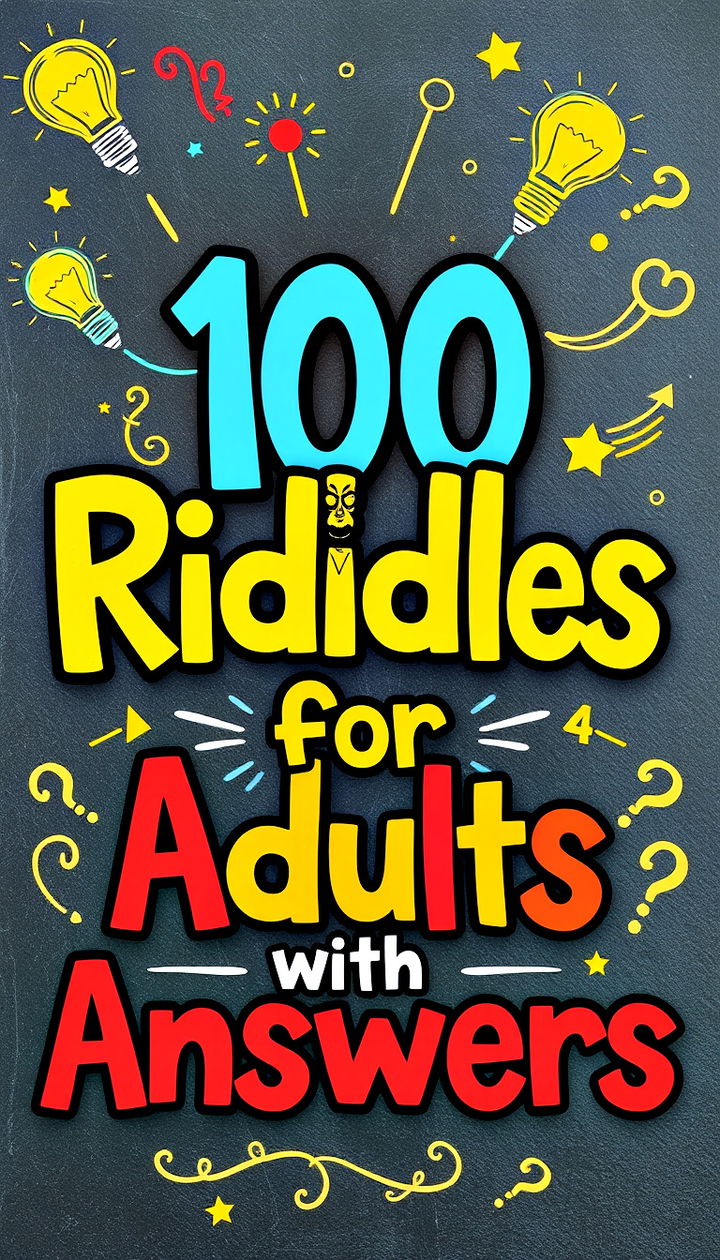
Wordplay Riddles
Wordplay riddles cleverly manipulate language, using puns, double meanings, and other linguistic tricks to create puzzles that are both challenging and fun. They often require you to think outside the box and consider different interpretations of words or phrases.
41. What word becomes shorter when you add two letters to it?
Answer: Short
Explanation: Adding the letters “er” to “short” creates “shorter,” which is indeed shorter in length.
42. What has a tongue, but cannot taste; has teeth, but cannot bite?
Answer: A shoe
Explanation: This riddle plays on the metaphorical use of “tongue” (the flap under the laces) and “teeth” (the projections on a zipper) in relation to shoes.
43. What word in the English language is always spelled incorrectly?
Answer: Incorrectly
Explanation: This riddle is a self-referential paradox, highlighting the word “incorrectly” itself.
44. What is always coming, but never arrives?
Answer: Tomorrow
Explanation: This riddle plays on the concept of time, as tomorrow is always a day away and never exists in the present moment.
45. What has an eye but cannot see?
Answer: A needle
Explanation: This riddle refers to the “eye” of a needle, which is the hole where the thread is inserted, not an actual eye capable of sight.
46. What has a neck without a head, a back without a spine, and can be found in a library?
Answer: A book
Explanation: This riddle uses metaphorical language to describe the physical attributes of a book: the spine (binding), the neck (the curved part of the pages near the binding), and its presence in libraries.
47. What has cities, but no houses; forests, but no trees; and water, but no fish?
Answer: A map
Explanation: This riddle highlights the representational nature of maps, which depict geographical features without containing the actual physical elements.
48. What is full of holes but can still hold water?
Answer: A sponge
Explanation: This riddle refers to the porous structure of a sponge, which allows it to absorb and retain water despite having many holes.
49. What question can you never answer yes to?
Answer: Are you asleep yet?
Explanation: This riddle creates a logical paradox. If you are asleep, you cannot answer. If you can answer, you are not asleep.
50. What has no voice, but can still tell you many things?
Answer: A book
Explanation: Books contain written words that convey information and stories, even though they don’t have a literal voice.
51. What has a heart that beats but no other organs?
Answer: A clock
Explanation: This riddle uses a metaphor, comparing the ticking of a clock to the beating of a heart.
52. What has a bark, but no bite?
Answer: A tree
Explanation: This riddle plays on the double meaning of “bark” – the sound a dog makes and the outer layer of a tree trunk.
53. What has no legs, but can travel the world?
Answer: A stamp
Explanation: Stamps are attached to letters and packages, allowing them to travel vast distances despite having no means of self-propulsion.
54. What has an eye but cannot see, a tongue but cannot taste, and a soul but cannot feel?
Answer: A shoe
Explanation: This riddle uses metaphorical language to describe the parts of a shoe: the eyelet (where laces are threaded), the tongue (the flap under the laces), and the sole (homophone of “soul”).
55. What has a neck without a head, and wears a cap?
Answer: A bottle
Explanation: This riddle combines the physical attributes of a bottle (the neck) with the image of a cap to create a humorous image.
56. What has to be broken before you can eat it?
Answer: A nut
Explanation: This riddle plays on the double meaning of “broken” – physically cracked and solved (like a code or a puzzle).
57. What is always hungry, but never eats?
Answer: Fire
Explanation: This riddle personifies fire, attributing the characteristic of hunger to its constant consumption of fuel.
58. What has a head and a tail, but no body?
Answer: A coin
Explanation: This riddle refers to the “heads” and “tails” sides of a coin, which lack a physical body in between.
59. What has no beginning, end, or middle?
Answer: A circle
Explanation: A circle is a continuous line with no defined start, finish, or midpoint.
60. What has words, but never speaks?
Answer: A book
Explanation: Books contain written words that convey information and stories, but they don’t have a literal voice.
Nature and Object Riddles
Riddles about nature and objects often challenge you to use your knowledge of the world around you to solve them. They can be based on the physical properties, functions, or symbolic meanings of natural elements or everyday items.
61. I have cities, but no houses; forests, but no trees; and water, but no fish. What am I?

Answer: A map
- Explanation: Maps represent geographical features but don’t contain the actual physical elements.
62. What has an eye but cannot see, a mouth but cannot speak, and a head but cannot think?
Answer: A needle
- Explanation: A needle has a hole at one end called the “eye” where the thread is inserted, but it cannot see. It has a long, pointed shaft but cannot speak or think.
63. What has no voice, but can still tell you many things?
Answer: A book
- Explanation: Books contain written words that convey information and stories, even though they don’t have a literal voice.
64. What has a neck without a head, a body without legs, and can be found in a library?
Answer: A bottle
- Explanation: This riddle uses metaphorical language to describe the physical attributes of a bottle: the neck (the curved part of the pages near the binding), the body (the container), and its presence in libraries.
65. What has cities, but no houses; forests, but no trees; and water, but no fish?
Answer: A map
- Explanation: This riddle highlights the representational nature of maps, which depict geographical features without containing the actual physical elements.
66. What is full of holes but can still hold water?
Answer: A sponge
- Explanation: This riddle refers to the porous structure of a sponge, which allows it to absorb and retain water despite having many holes.
67. What has no voice, but can still tell you many things?
Answer: A book
- Explanation: Books contain written words that convey information and stories, even though they don’t have a literal voice.
68. What has a neck without a head, and wears a cap?
Answer: A bottle
- Explanation: This riddle combines the physical attributes of a bottle (the neck) with the image of a cap to create a humorous image.
69. What has to be broken before you can eat it?
Answer: A nut
- Explanation: This riddle plays on the double meaning of “broken” – physically cracked and solved (like a code or a puzzle).
70. What is always hungry, but never eats?
Answer: Fire
- Explanation: This riddle personifies fire, attributing the characteristic of hunger to its constant consumption of fuel.
Philosophical and Metaphorical Riddles
These riddles delve into deeper questions about life, existence, and the human condition. They often use metaphors and symbolism to explore complex ideas and encourage introspection.
71. What is always coming, but never arrives?
Answer: Tomorrow
Explanation: This riddle reflects on the elusive nature of time and the constant pursuit of the future.
72. I am lighter than a feather, yet the strongest person cannot hold me for long. What am I?
Answer: Breath
Explanation: This riddle emphasizes the fragility and impermanence of life, as breath is essential but fleeting.
73. What has no voice, but can still tell you many things?
Answer: A book
Explanation: This riddle highlights the power of written language to communicate knowledge and ideas across time and space.
74. What has an end but no beginning, a home but no family, and a space without room?
Answer: A circle
Explanation: This riddle explores the concept of infinity and the cyclical nature of existence.
75. What is always in front of you but can’t be seen?
Answer: The future
Explanation: This riddle underscores the mystery and uncertainty of what lies ahead.
76. What can you keep after giving it to someone?
Answer: Your word
Explanation: This riddle emphasizes the importance of honesty and integrity in maintaining trust and relationships.
77. What has a heart that beats but no other organs?
Answer: A clock
Explanation: This riddle uses a metaphor to represent the passage of time and the finite nature of life.
78. What is always hungry but never eats?
Answer: Fire
Explanation: This riddle personifies fire, symbolizing its insatiable appetite for fuel and its transformative power.
79. What has a neck without a head, and wears a cap?
Answer: A bottle
Explanation: This riddle, while seemingly lighthearted, can also be interpreted as a commentary on the superficiality of appearances.
80. I am born of water, but if I return to water, I die. What am I?
Answer: Ice
Explanation: This riddle reflects on the delicate balance of nature and the transformative power of the elements.
Hard Riddles
Hard riddles push the boundaries of logic, creativity, and lateral thinking. They often involve complex scenarios, wordplay, or hidden meanings that require deep thought and careful consideration to unravel. Prepare to be challenged!
81. I speak without a mouth and hear without ears. I have no body, but I come alive with wind. What am I?
Answer: An echo
Explanation: An echo is a sound that is repeated due to the reflection of sound waves. It has no physical body but is created and carried by the wind.
82. What is always hungry, but never thirsty? Always eating, but never full? Always coming, but never arrives?
Answer: A fire
Explanation: This riddle uses personification to describe the characteristics of fire. It constantly consumes fuel (“hungry” and “eating”), but it can never be satiated. It also spreads and grows (“always coming”) but never reaches a final destination.
83. I have cities, but no houses; forests, but no trees; and water, but no fish. What am I?
Answer: A map
Explanation: A map is a representation of geographical features, but it doesn’t contain the actual physical elements like houses, trees, or fish.
84. I am taken from a mine, and shut up in a wooden case, from which I am never released, and used by almost everybody. What am I?
Answer: Pencil lead
Explanation: Pencil lead (graphite) is a mineral mined from the earth. It is then encased in a wooden case (the pencil) and used for writing. Once enclosed, it’s rarely removed from the case.
85. What has an eye but cannot see?
Answer: A needle
Explanation: The hole at the end of a needle where the thread is inserted is called the “eye,” but it doesn’t have the ability to see.
86. What has a neck without a head, a back without a spine, and can be found in a library?
Answer: A book
Explanation: This riddle uses metaphorical language to describe the parts of a book: the spine (the bound edge), the neck (the curved part of the pages near the binding), and its common location in libraries.
87. Alive without breath, as cold as death; never thirsty, ever drinking, all in mail never clinking.
Answer: A fish
Explanation: Fish live underwater (“alive without breath”), are cold-blooded (“as cold as death”), constantly take in water through their gills (“ever drinking”), and are covered in scales (“all in mail”) that don’t make noise.
88. This belongs to you, but everyone else uses it more.
Answer: Your name
Explanation: Your name is uniquely yours, but other people use it more often to address or refer to you.
89. What has no legs, but can travel the world?
Answer: A stamp
Explanation: A stamp is affixed to letters and packages, enabling them to travel vast distances even though the stamp itself remains stationary.
90. I have cities, but no houses; forests, but no trees; and water, but no fish. What am I?
Answer: A map
Explanation: Maps are representations of geographical features but don’t contain the actual physical elements.
91. The more you take, the more you leave behind. What am I?
Answer: Footsteps
Explanation: Every step you take creates a footprint, leaving behind a trail as you move forward.
92. What has a head and a tail, but no body?
Answer: A coin
Explanation: Coins have two sides, often referred to as “heads” and “tails,” but they lack a physical body connecting them.
93. What has an eye but cannot see?
Answer: A hurricane
Explanation: The center of a hurricane is called the “eye,” but it’s a calm area within the storm and doesn’t possess the ability to see.
94. What gets wetter the more it dries?
Answer: A towel
Explanation: A towel absorbs water to dry other things, making itself wetter in the process.
95. I am always coming, but never arrive. What am I?
Answer: Tomorrow
Explanation: Tomorrow is always a day away and never exists in the present moment.
96. What has to be broken before you can use it?
Answer: An egg
Explanation: You need to crack the shell of an egg before you can access its contents.
97. What is full of holes but still holds water?
Answer: A sponge
Explanation: Sponges have a porous structure that allows them to absorb and hold water despite having many holes.
98. What question can you never answer yes to?
Answer: Are you asleep yet?
Explanation: If you’re asleep, you can’t answer. If you can answer, you’re not asleep.
99. I have cities, but no houses; forests, but no trees; and water, but no fish. What am I?
Answer: A map
Explanation: Maps are representations of geographical features but don’t contain the actual physical elements.
100. What has no voice, but can still tell you many things?
Answer: A book
Explanation: Books contain written words that convey information and stories, even though they don’t have a literal voice.
Challenge Your Mind:
We encourage you to try solving these riddles on your own before looking at the answers. Give yourself a chance to exercise your brain and see how many you can crack! If you have any favorite riddles that we haven’t included, please share them in the comments section below. We’d love to hear from you!
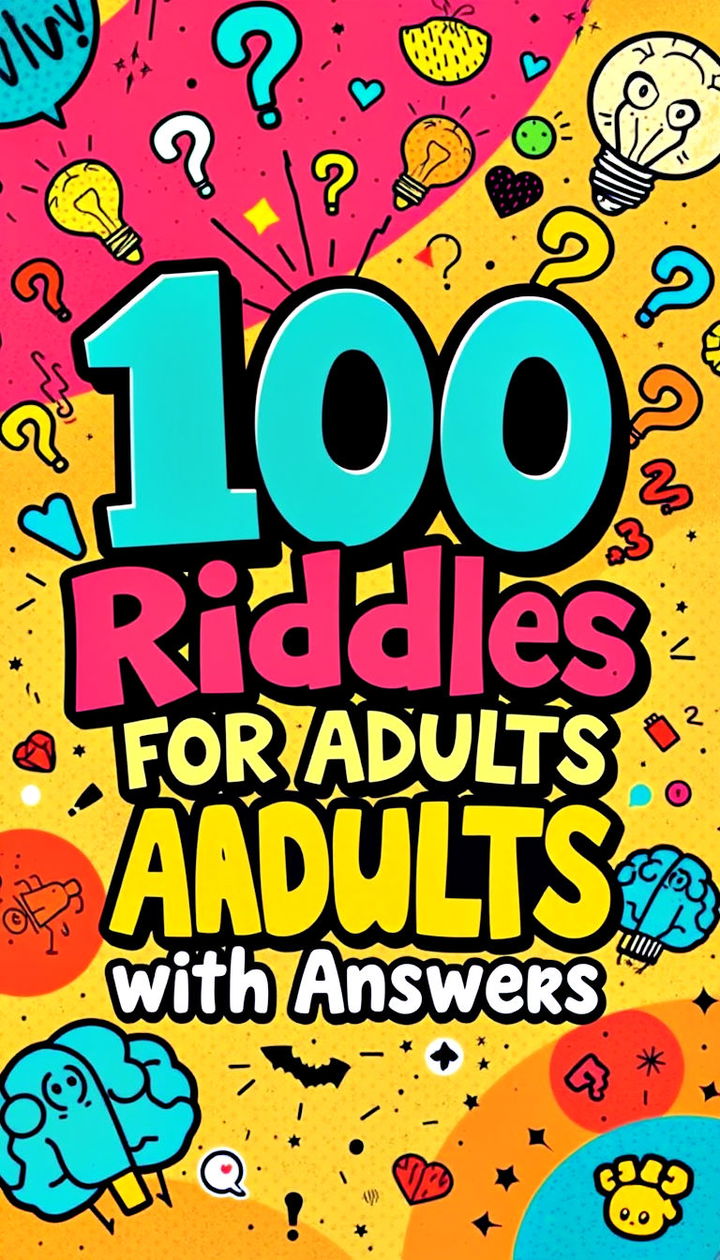
How to Memorize Riddles
Memorizing riddles can be a fun way to keep your mind sharp and have a few tricks up your sleeve for social interactions. Here are some strategies to help you remember these brain teasers:
- Association: Connect the riddle’s elements to a visual image or a story. The more absurd or memorable the association, the easier it will be to recall.
- Repetition: Practice reciting the riddle and its answer several times. You can even try writing them down or saying them aloud to yourself.
- Categorization: Group riddles by theme (e.g., animals, objects, wordplay) to make them easier to remember.
- Share and Discuss: Telling riddles to friends and family reinforces your memory and makes the learning process more enjoyable.
Benefits of having a repertoire of riddles:
- Conversation starter: Riddles can break the ice and spark interesting conversations in social settings.
- Mental exercise: Recalling and solving riddles helps keep your brain active and improves cognitive functions like memory and problem-solving skills.
- Entertainment: Sharing riddles can bring laughter and enjoyment to yourself and those around you.
- Impress others: Having a few clever riddles memorized can make you the life of the party and leave a lasting impression.
5. Conclusion
Riddles for adults are a timeless form of entertainment that offers both fun and educational value. They challenge us to think outside the box, expand our knowledge, and exercise our brains. We hope you enjoyed this collection of 100 riddles for adults. Remember, the next time you’re looking for a way to spice up a social gathering or give your brain a workout, turn to these riddles and let the fun begin!
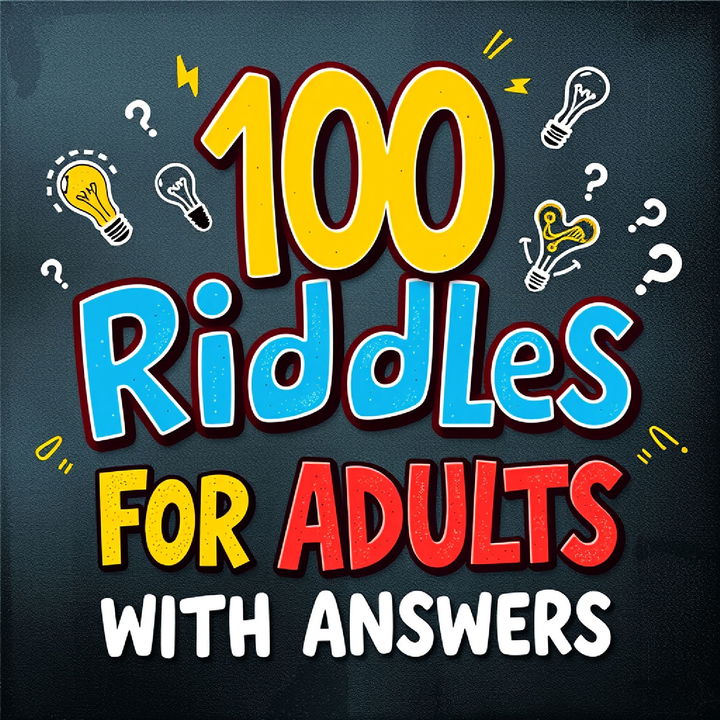
Frequently Asked Questions
1. Are these riddles suitable for adults only, or can children enjoy them too?
While the title suggests these riddles are for adults, many of them can be enjoyed by older children and teenagers as well. However, some riddles may involve more complex concepts or wordplay that might be better suited for a mature audience.
2. How can I use these riddles to entertain a group of adults?
You can use these riddles in various ways to entertain adults:
- Casual gatherings: Share a few riddles during conversations to spark laughter and mental stimulation.
- Parties and game nights: Organize a riddle competition or trivia game using these riddles.
- Team-building activities: Use riddles as icebreakers or team challenges to encourage collaboration and problem-solving.
- Travel and waiting times: Keep a few riddles handy to pass the time during long journeys or waiting periods.
3. Can solving riddles improve my cognitive skills as an adult?
Yes, solving riddles can offer several cognitive benefits for adults, such as:
- Enhancing critical thinking and problem-solving abilities
- Improving memory and recall
- Strengthening focus and attention
- Expanding vocabulary and language skills
- Boosting creativity and out-of-the-box thinking
4. Are there any specific strategies for solving difficult riddles?
Here are some tips for tackling those challenging riddles:
- Read the riddle carefully and pay close attention to every word.
- Look for hidden meanings, wordplay, or puns.
- Consider multiple interpretations and think outside the box.
- Break down the riddle into smaller parts and analyze each element.
- Don’t be afraid to take breaks and come back to the riddle later with a fresh perspective.
5. How can I share these riddles with others?
You can share these riddles in various ways:
- Social media: Post your favorite riddles on platforms like Facebook, Twitter, or Instagram.
- Messaging apps: Send riddles to friends and family through WhatsApp, Messenger, or other messaging platforms.
- Email: Share a collection of riddles with your colleagues or loved ones through email.
- In person: Tell riddles during conversations or social gatherings to entertain and engage others.
6. Are there any cultural or historical references in these riddles?
Some riddles might draw inspiration from cultural or historical elements. Understanding these references can add another layer of depth and enjoyment to the riddle-solving experience.
7. Can riddles help me relax and de-stress?
Yes, engaging with riddles can be a relaxing and enjoyable activity that helps to distract from everyday worries and stress. The mental focus required to solve riddles can also promote a sense of calm and mindfulness.
8. Are there any benefits to creating my own riddles?
Creating your own riddles is a fantastic way to flex your creative muscles and express your personality. It also allows you to tailor riddles to specific interests or themes.
9. Can riddles be used for educational purposes?
Definitely! Riddles can be used in educational settings to enhance learning and engagement. They can be incorporated into lessons to introduce new concepts, reinforce vocabulary, and promote critical thinking.
10. What if I get stuck on a riddle and can’t figure out the answer?
Don’t worry, it’s perfectly normal to get stuck on a riddle! Take a break, try looking at it from a different angle, or ask a friend for help. Sometimes, the most challenging riddles have the simplest solutions.

